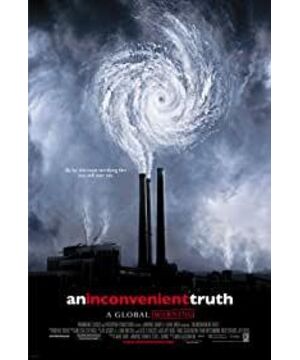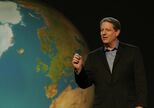01
His name is Gore, and on April 3, 1989, he witnessed his 6-year-old son being hit by a car in front of his eyes and sent to the hospital in critical condition. Gore's heart was cut as he looked at his son, who was full of tubes. A month later, when his son recovered, he looked at the calendar and let out a long sigh. After experiencing the fragility of life, he sent himself a soul torture: "How should I spend my life?"
After that, he plunged headlong into what he once loved so much, trying to gain a deeper understanding of meteorological issues. He knew that the earth was deteriorating, but he never stepped into the game. This time, he wanted to experience the experience and data of others.
He went to Antarctica, the South Pole, the North Pole, the Amazon, he went all over the world, and he asked all kinds of scientists, trying to dig deep into problems that he had never looked into. On the way, he saw a feverish Earth, and he confirmed the teacher's experience and data.
He realized: "Things that we have become accustomed to may no longer be in front of our children's eyes."
So, with his own research, he gave more than 1,000 lectures around the world (as of 2005). 1000 lectures, how long is it? If there is 1 game per week, 4 games a month, 1,000 games is nearly 20 years, and Tang Sanzang has only 14 years to study scriptures from the West. This documentary was released in 2005, and he released a second one in 2017. He looks much older, but he is still on the road.
02
Earth is destroying because of rising temperatures.
When the sun shines on the earth, the earth absorbs some of the heat and bounces back some of the heat. The bounced heat hits the atmosphere on the way back, and the atmosphere leaves some of that heat behind to keep the Earth warm, which is good because it keeps the Earth warm enough to support life like us.
Therefore, our body temperature is affected by two variables: one is the direct heat from the sun; the other is the heat left by the atmosphere. Since the direct heat from the sun is out of our control, the heat left by the atmosphere is the only variable to maintain the right temperature.
When the heat left by the atmosphere increases, our body temperature will increase; otherwise, it will decrease.
What causes the heat left by the atmosphere to change? is the thickness of the atmosphere. The thicker the atmosphere, the more temperature is left behind, and our body temperature will rise; conversely, the less temperature is left, the lower our body temperature will be.
The change of body temperature determines the change of our body temperature. It is more comfortable to maintain the body temperature at 36-37 degrees. If it is higher than 37 degrees or lower than 36 degrees, discomfort will occur. If it is higher than 44 degrees or lower than 30 degrees , life will end.
Simply put: the thickness of the atmosphere determines the temperature, the temperature determines the temperature of the human body, and the temperature of the human body determines the life and death of you and me.
Since the thickness of the atmosphere determines your life and mine, what determines its thickness?
It is carbon dioxide emissions. The more carbon dioxide emissions, the thicker the atmosphere and the higher the temperature of the earth.
Scientists have made data statistics for 650,000 years. As shown in the figure above, the red line is carbon dioxide and the blue line is temperature. We can see that there is a strong correlation between them. One thing to note: CO2 emissions and temperatures keep fluctuating up and down, but CO2 levels never exceed 300.
Now, this concentration is far more than 300. The yellow dot below is the carbon dioxide concentration data in 2004, and the top yellow dot is the carbon dioxide emission position after 50 years without intervention.
03
The Earth is warming and destroying, so what? What specific consequences will it have? It will make the virus run rampant, make us instantly frozen, and drown our "Beijing Shanghai". Let's watch them one by one.
1. Virus
Because we are going through a large global epidemic, the first thing that comes to my mind is the virus, let's see what is the relationship between climate warming and virus rampant.
(1) Dry climate improves virus transmission efficiency
I believe everyone has heard of aerosol transmission, how is it? When we cough the coronavirus out of our lungs, the virus hangs in the air for a long time, forming an aerosol like a layer of fog in the woods. At this time, if someone passes by, it may be infected by inhalation. This is terrifying, because no matter whether you see someone or not, the virus may be in the air, and you don't know where it is, so you can only stay at home and dare not go out.
What if the climate is humid? As the virus leaves our body, it binds to water molecules, and it becomes heavy and quickly falls to the ground, table top, or doorknob. It does not form aerosols to float in the air, which greatly reduces the transmission efficiency of the virus. As long as there is no one within a few meters in front of us, we can take off our masks at any time, wash our hands well, and do not touch or touch our faces, which can effectively prevent the spread of the virus.
(2) The virus has to forcibly enter the non-adapted host. If the temperature gradually rises, animals have the opportunity to evolve and iterate, and slowly adapt to the changes of nature. But if the temperature changes suddenly, the animals can't keep up, after all, they don't have human air conditioners.
Species are going extinct at a rate 1,000 times faster than in nature. Don't think that this has nothing to do with human beings, it has a big relationship.
I once published an article describing the relationship between animal extinction and viruses in detail ( click to view the full text ), as shown below:
Viruses are resident animals, they can only live in other organisms. Every organism, including us, harbors at least a few viruses. Due to the long-term running-in with their own host, they have reached a balanced state of harmonious coexistence, so as long as the virus stays in their own host, everyone is safe.
Each species is the host of a large group of viruses. When species go extinct one by one, it means that a large group of viruses has no house to live in. In order to survive, it must move to a new home.
If species extinction is slow, these viruses feel that the number of their hosts is decreasing, and they will slowly do experiments until they finally adapt to the new host before moving there. But now because the "demolition" is too sudden, they can only blindly escape into the bodies of various creatures. Anyway, they are all dead, so let's use the number to try their luck. die with the host.
When the virus hits its luck, it will inevitably move into our human body. Just imagine that there are only us humans left in the world, and that group of viruses will pass through our bodies one by one like flies.
Therefore, this new coronavirus is not a special event. If the earth continues to accelerate its warming, there will be more and more such events. We no longer need to think about returning to normal, because this is the normal state.
2. Frozen Man
The sea connects every city and determines our climate around the globe.
The animation above is an ocean transport belt, with red representing warm currents and blue representing cold currents. When the warm current is above, it will become heavier and sink to the bottom of the sea when it encounters cold air, and it will flow in the opposite direction; when the cold current is below, it will become lighter and float to the sea surface when it encounters hot air, and it will flow in the opposite direction.
In the upper left corner of the ocean transport belt, there is a loop key point (pictured below), which is the North Atlantic Ocean.
The Gulf Stream travels north to come here, encountering cold air from the North Pole. The warm Gulf Stream releases hot steam under the action of evaporation, and the hot steam, driven by the earth's rotation and prevailing winds, enters western Europe and warms the inhabitants there.
After the heat of the sea water is taken away here, the temperature will decrease, and the salinity will increase with it, because the salt does not evaporate together. This makes the sea water thicker and heavier. As a result, the icy, viscous and heavy water would sink at five million gallons per second and flow back to the south.
This is the key point of the earth's ocean current cycle. The warm current goes north to become cold current, and then goes south for an infinite cycle. This is also where scientists are most worried about going wrong.
Before the end of the last ice age, to the west (left) of the key point of this cycle was North America, where there was a glacier, and the glacier melted to form a large freshwater lake. To the east of this freshwater lake was a large glacier, similar to a dam , just blocking the flow of the freshwater lake into the North Atlantic. However, one day the glacier collapsed, and the freshwater lake suddenly poured out and rushed into the North Atlantic Ocean, diluting the cold, viscous and heavy seawater of the North Atlantic Ocean and making it lighter.
So the sea stops sinking and the cycle stops. Without the hot steam, Europe instantly entered an ice age that lasted 900-1000 years.
Now, without that glacier in North America, the threat is gone. But look to the north (upper) side of the loop, that's the North Pole. The Arctic glaciers are melting rapidly at an unimaginable speed. If the fresh water after it melts flows into the North Atlantic again, the circulation of ocean currents will stop again, and the earth will enter an ice age in an instant.
It turned out that the warming climate will not necessarily kill me in the end, it may even freeze me into a little iceman. 3. Underwater city
Let's move our eyes to another vertex of the earth, the South Pole.
Antarctica has the largest ice sheet in the world, with ice shelves reaching up to 700 feet, which is incomparably magnificent and huge.
There is a lot more ice here than the Arctic. It should be better here, right? Will not face the phenomenon of rapid ablation. Not really, the problem here is bigger.
Humans used to think that the ice shelf here would not melt for 100 years, but now it is melting in units of days.
Pictured above is an island in the Antarctic archipelago called Greenland that is rapidly melting.
Like ice in a glass melting, it will make the water in the glass rise. Once the island is fully melted, the world's sea level will be 20 feet higher, and 20 feet is about 6.1 meters. What is the altitude of Shanghai? 4.5 meters, which means that by then, Shanghai and its surroundings will cease to exist. Other countries are not much better, the Netherlands or even the country as a whole disappeared.
As the ice shelves of Antarctica melt one by one, the water level of the earth continues to rise, and there will be less and less land, and finally all sink to the bottom of the sea. By then, the unreal scene of the sci-fi movie "Future Water World" will be in front of us.
04
How to do? Viruses become the norm; ocean current circulation ceases instantaneously; land sinks into the sea.
At their core, there is only one problem: rising temperatures.
Why is the temperature rising? Because the atmosphere has thickened. Why does the atmosphere thicken? because of the increase in carbon dioxide concentration. Why is carbon dioxide concentration rising? Because of our living habits.
We all like the immediate benefit; we all think about it later; we all think someone will do it.
If the earth on which we live is destroyed, will everything else be worthwhile? The following are the per capita carbon dioxide emissions and total emissions of various countries in 2005. China's per capita emissions are not high, but our population is large, so the overall emissions are relatively high. The United States is properly ranked first, and it is a serious drag on environmental protection issues.
We can't decide how many people there are in the world or what others do, but we can decide ourselves. If everyone made just a few small changes, as shown in the graph below, we could easily reduce CO2 emissions to pre-1970 levels.
On April 3, 1989, Gore's son was dying. He picked up his son and took him to the hospital, where he recovered a month later. The earth is also dying, and we can't just stand there and watch our son lie in a pool of blood and let it bleed. We at least take him to the hospital, although we don't know medicine, at least we can do what we can.
My specific approach is as follows: (1) Plant at least 10 trees every year; (2) Do not buy cars, but only electric vehicles; (3) Try to walk and ride bicycles for short distances, and use long distances for public use; (4) Only buy Necessary household appliances, with low energy consumption as the first choice; (5) Saving electricity, such as using energy-saving light bulbs, going to bed early at night, and watching less TV; (6) Saving water, such as taking a quick shower, washing vegetables, and soaking feet toilet; (7) write this article and share it. ...
A spaceship enters the vast universe to perform a mission. When it traveled 4 billion miles from Earth, Carl Sagan said, "Let's take another picture of Earth." Do you see that blue dot? That's us, everything in human history, happened at this little point. All successes and failures, all wars and famines, all great progress. This is our only home, and now it faces a crisis, a crisis to our very existence on Earth, and the future of human civilization. Click to play the 14-minute essence clip
Online play address: https://v.youku.com/v_show/id_XMjk1NDU4MjIyOA==.html?spm=a2h0k.11417342.soresults.dplaybutton&lang=%E8%8B%B1%E8%AF%AD
High-scoring documentaries you might also like:
(click directly on the text to view)
"The Fruit of Life" What is the happy old age like?
What is a happy life in "Finding Sugar Man"?
"One Day in the Floating Life" to see everyone's attitude towards life
"Face, Village" looks at the romance unique to the French
"The God of Sushi" to see the work attitude of the great god
Author WeChat: samuelzp
Public number search: Zhou Zisheng
View more about An Inconvenient Truth reviews











